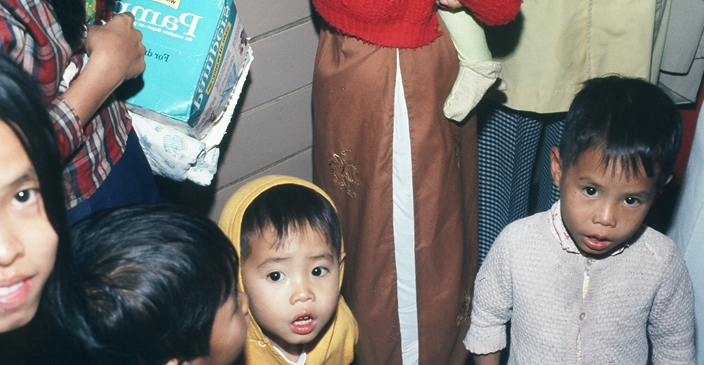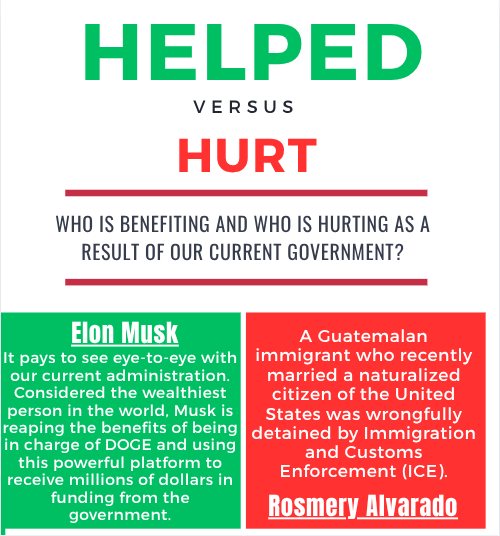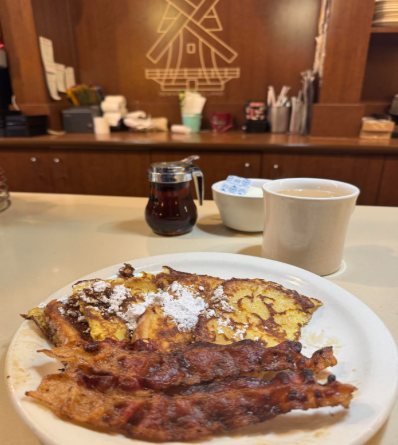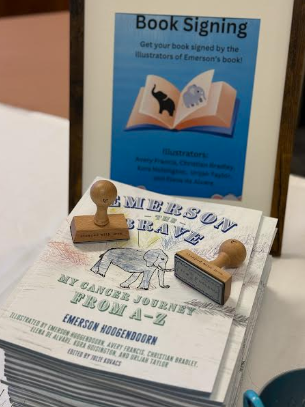Five-year-old Hoa Nguyen sat in the cramped, sweaty belly of a small fishing boat, bobbing back and forth to the rhythm of the powerful Pacific. As his small, exhausted body swayed with the ocean waves, a familiar nauseous feeling crept into his throat. Vomit. For the countless time that week, Nguyen stumbled to the edge of the boat, vomiting the rations of food he ate that day. For days upon days, Nguyen lived this routine. The small fishing boat, which was once a beacon of hope for the family, ran out of gas days ago. Their only option now was to drift with the current of the sea, praying for the best. As Nguyen sat back down, he hoped to rest for a moment before the sea sickness overtook him again. One day bled into another and another and another. With every passing sunrise and sunset, fear and anxiety gripped the family stronger than the last.
In 1975, Macatawa Bay Middle School Instructor Hoa Nguyen was only five years old. Like any child at his age, he enjoyed playing, exploring, and learning with his family of twelve by his side. Nguyen’s life was quite normal, but that would all change with one vital decision.
For months leading up to this life-altering decision, Nguyen’s mother and father were consumed by rumors that were circulating through Vietnam, rumors of communism that riddled them with fear. If they stayed, they would be forced to succumb to the communist rule that the family so dreaded. But, leaving came with its own sacrifices and risks.
When it came down to making a decision, Nguyen’s aunt and uncle couldn’t find their two eldest sons. Nguyen’s eldest brother was also missing. In Vietnamese culture, the firstborn son is a very esteemed and special family member, making the disappearance of these three family members all the more distressing. To add to the stress, Nguyen’s youngest sibling was only a little over a year old. Taking part in the journey could be fatal. With the risk of never seeing their family members again, combined with the chance of losing an innocent toddler, the family had a lot to consider. The decision would be anything but easy, but they would ultimately make a choice.
They chose to leave Vietnam.
Nguyen’s father, brother, and cousins were able to find a tiny fishing boat the family could escape on. They packed quickly. Valuable jewelry along with clothing, food, and other essentials were quickly gathered before they made their way onto the boat. Nguyen, his parents, siblings, aunt, uncle, and cousins, along with several other families, got to the boat and prepared to board. Nguyen’s father immediately started picking up the children and tossing them onto the boat. One slip could’ve meant a fatal fall into the ocean. The situation was tense, scary, almost surreal. Waves whipped against the side of the boat as the family scurried to load their belongings. Reality was just starting to set in. Anxiety and unease crept up on the family all at once, like a tsunami suddenly crashing onto shore.
In that moment, Nguyen’s uncle spoke up. He changed his mind. He and his son were no longer going to make the journey; they decided to stay back in hopes of finding the two missing sons. Now, Nguyen’s father was the only adult male making the journey. He would be responsible for two families and nearly ten children. Despite everything, he continued on, with or without the help of his brother and nephew. When all the children were safe on the boat, Nguyen’s father finally boarded. The driver revved the boat’s engine, leading Nguyen and his family into the vast ocean. This was it. It was real now. With every passing minute, Vietnam disappeared farther into the distance. Finally, they were escaping.
At first, hope blossomed in the hearts of the escapees. They could almost taste freedom. Their fears of communism seemed far away, overtaken by new dreams of freedom.
These positive thoughts, though, were short-lived.
One day, the boat stopped working. It ran out of gas…in the middle of the Pacific Ocean. They were drifting at the mercy of a 68 million square mile ocean. Suddenly, their boat to freedom became a boat to nowhere.
The ocean air was stuffy and sticky, and seasickness overtook Nguyen the entire time he spent on the boat. Not only were conditions physically uncomfortable and painful, but mentally families had to grapple with the possibility of dying in the boat, lost at sea forever. Would all the risks Nguyen’s family took be for nothing?
After what felt like an endless time lost at sea, they spotted something far into the distance, a speck among the endless waves of the ocean. As they drifted further, Nguyen’s family realized that it was a huge barge, the first ship they spotted since running out of gas. The barge, they would later find out, belonged to the United States Navy and was strategically placed in that particular area to help refugees leaving Vietnam.
This was a godsend for Nguyen and his family. It almost seemed to good to be true.
The next thing Nguyen remembers is seeing his father from atop the barge. After weeks lost at sea, Nguyen and the other families were able to come aboard where they would finally be safe. Nguyen’s father came down onto the fishing boat again, taking his son onto his back.
Nguyen locked onto his father, his knuckles white from gripping so tightly. Atop his father’s back, the ocean seemed a million miles below him. Nguyen was scared, scared of falling, scared that the ocean would betray him again just as it did with the fishing boat. He grasped his father so tightly that he was nearly choking him.
As the top of the boat emerged into focus, Nguyen was instantly relieved. On the deck, Nguyen saw other children his age, playing and running in the open space of the barge. “Hey I can play now too,” Nguyen thought, “I can stretch my legs and have fun!” The idea of running around and being a kid again pushed his fears into the back of his head, letting happiness and joy in again. He got off his father’s back, safe for now.
During the time that they spent on the barge, Nguyen and his family were able to communicate with other refugee families and seek comfort in their shared pain and experience. They shared food with one another and comforted one another. Every few days, the military would pick up refugee families from the barge and bring them to camps on dry land.
When they were chosen to leave, Nguyen and his family left the barge for the Philippines. As the family was filing the necessary paperwork to enter the then territory of the United States, they looked out onto the other side of the fence onto Philippines territory. Many other refugees who were already processed were on the other side, and Nguyen’s family felt relieved and lucky that they could soon join them.
Through the cross-hatched wire of the fence, Nguyen and his family spotted something. Family. The shock nearly took their breath away. Beyond the fence, Nguyen spotted his uncle and cousins. Just before they boarded the fishing boat, Nguyen’s same uncle and cousin decided to leave to find his other two relatives. But here they were, all four of them, against all odds. Safe, away from Vietnam, across the ocean, somehow in the same place as Nguyen and his family. They found out that his uncle and cousins had found another boat and made their own journey through the ocean. The families embraced when they thought they would never again have the chance to
Yet again, Nguyen and his family were graced with extreme luck.
The family spent a few weeks in the Philippines in a refugee camp, and from there transferred to four different locations. They traveled to Guam, Hawaii, California, and Pennsylvania. Memories from each location blurred together, but every move meant a step closer to living in the US. As they made their journey across the two US territories and three states, each camp proved to be a little different than the last, and some camps were more memorable than others.
The camp in California was Nguyen’s favorite. The camp was located in a drive-in movie theatre, so Nguyen and his family got to watch all sorts of films during their time there. Nguyen remembers sinking into the theatre seat for his first movie ever. His face lit up as the screen shown hilarious scenes of Bugs Bunny, sending him into a fit of giggles. He was finally starting to feel like a five-year-old again.
Nguyen remembers his summertime in Pennsylvania, too. He basked in the warmth of the summer sun, and the freedom of being a kid after what felt like a lifetime of uncertainty and fear. He spent afternoons picking wildflowers and nights singing “Kum By Yah” by the glow of a campfire. Some nights, he and his cousins would race down grassy lawns after fireflies, watching them twinkle like stars in the Pennsylvania skyline. The refugee camp felt more like a summer camp, and Nguyen loved all the new, fun activities he got to experience.
By the time summer faded into fall, Nguyen and his family were moved to another location. They moved one final time to Kalamazoo, MI. Northern Heights Christian Reformed church sponsored Nguyen’s family travel to Michigan, and another church sponsored his uncle’s family.
Throughout the almost insurmountable risk and struggle, Nguyen, and his family, by some sort of miracle, made it successfully from Vietnam to Michigan. Their story is one of incredible courage, strength, and faith.
Nguyen now teaches social studies, coaches soccer, and has a family of his own. For most, this seems typical. But in Nguyen’s case, it’s what he left his home for, traveled across the ocean for, spent weeks lost at sea for. It’s what he and his family risked everything for…the American dream.







